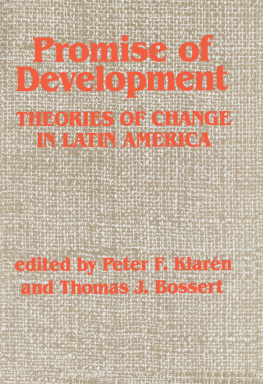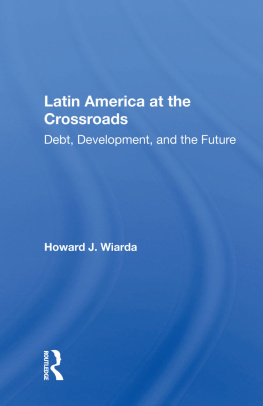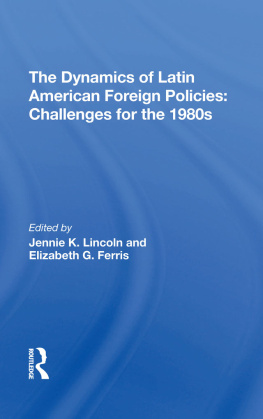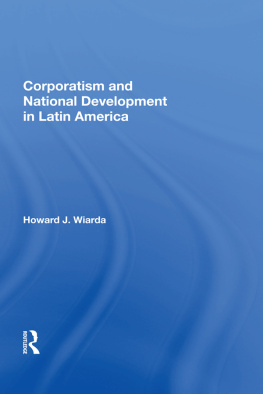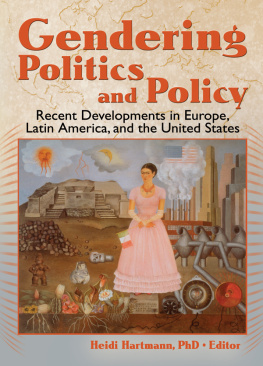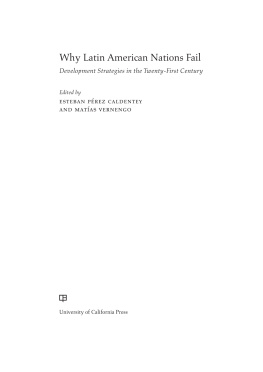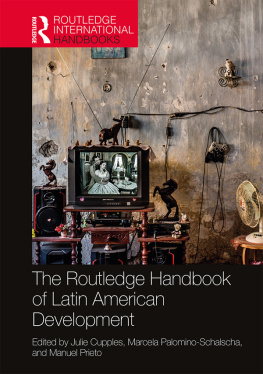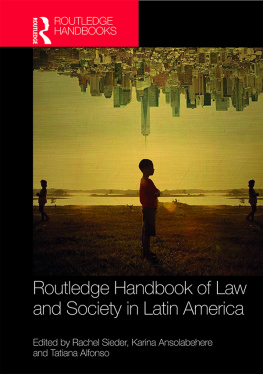First published 1986 by Westview Press
Published 2018 by Routledge
711 Third Avenue, New York, NY 10017, USA
2 Park Square, Milton Park, Abingdon, Oxon OX14 4RN
Routledge is an imprint of the Taylor & Francis Group, an informa business
Copyright 1986 Taylor & Francis
All rights reserved. No part of this book may be reprinted or reproduced or utilised in any form or by any electronic, mechanical, or other means, now known or hereafter invented, including photocopying and recording, or in any information storage or retrieval system, without permission in writing from the publishers.
Notice:
Product or corporate names may be trademarks or registered trademarks, and are used only for identification and explanation without intent to infringe.
Library of Congress Cataloging-in-Publication Data
Main entry under title:
Promise of development.
Bibliography: p.
Includes index.
1. Latin AmericaPolitics and government
1945Addresses, essays, lectures.2. Authoritarianism
Latin AmericaAddresses, essays, lectures.
3. Latin AmericaEconomic conditions1945Addresses,
essays, lectures.4. Latin AmericaDependency
on foreign countriesAddresses, essays, lectures.
5. Corporate stateLatin AmericaAddresses, essays,
lectures.I. Klarn, Peter F., 1938
II. Bossert, Thomas J.
JL966.P751986303.409885-26425
ISBN 13: 978-0-8133-0007-8 (pbk)
ISBN 13: 978-0-8133-0006-1 (hbk)

Also of Interest
Latin America: Capitalist and Socialist Perspectives of Development and Underdevelopment, Ronald H. Chilcote and Joel C. Edelstein
The Gap Between Rich and Poor: Contending Perspectives on the Political Economy of Development, edited by Mitchell A. Seligson
Latin American Politics and Development, edited by Howard J. Wiarda and Harvey F. Kline
Latin American Political Economy: Financial Crisis and Political Change, edited by Jonathan Hartlyn and Samuel A. Morley
From Dependency to Development: Strategies to Overcome Underdevelopment and Inequality, edited by Heraldo Muoz
The Fitful Republic: Economy, Society, and Politics in Argentina, Juan E. Corradi
New Directions in Comparative Politics, edited by Howard J. Wiarda
Latin America, Its Problems and Its Promise: A Multidisciplinary Introduction, edited by Jan Knippers Black
Theories of Development and Underdevelopment, Ronald H. Chilcote
A Bias for Hope: Essays on Development and Latin America, Albert O. Hirschman
Limits to Capitalist Development: The Industrialization of Peru, 19501980, John Weeks
Regional Integration: The Latin American Experience, edited by Altaf Gauhar
Politics and Economics of External Debt Crisis: The Latin American Experience, edited by Miguel S. Wionczek, in collaboration with Luciano Tomassini
Brazils Economic and Political Future, Julian Chacel, Pamela S. Falk, and David V. Fleischer
Note
Available in hardcover and paperback.
Contents
, Peter F. Klarn
PART 1
MODERNIZATION
, Seymour Martin Lipset
, Kalman H. Silvert
, John J. Johnson
, Jacques Lambert
PART 2
DEPENDENCY AND MARXISM
, Andre Gunder Frank
, Celso Furtado
, Fernando Henrique Cardoso and Enzo Faletto
, Ernesto Laclau
PART 3
CORPORATISM
, Howard J. Wiarda
, Ronald C. Newton
PART 4
BUREAUCRATIC AUTHORITARIANISM
, Guillermo ODonnell
, Guillermo ODonnell
, Thomas J. Bossert
Guide
7
Economic Development of Latin America
Celso Furtado
Celso Furtado, a Brazilian economist and historian, discusses the new international division of labor that emerged in the world economy between 1820 and World War I. During this period, the Latin American periphery specialized in primary production for the industrializing West, particularly England. Furtado constructed a typology of economies that exported raw materials, dividing Latin America into three primary producing zones: countries exporting temperate agricultural commodities (principally Argentina and Uruguay, which relied on extensive land use); countries exporting tropical agricultural commodities, such as sugar, tobacco, and coffee (lowland regions); and countries producing mineral products (Mexico, Chile, Peru, and Bolivia, and later Venezuela, an oil producer). Furtado then describes the impact of the 1929 world economic crisis, which abruptly terminated this long phase of Latin American export expansion. This crisis was followed by the emergence of import-substitution industrialization (ISI), a crucial economic process that had profound political implications for dependency analysis, as we will see in .
The Transformation of International Trade in the Second Half of the Nineteenth Century and Its Impact on Latin America
International Division of Labour
During the first half of the nineteenth century, the Industrial Revolution was essentially an English phenomenon. For this reason the structural evolution of the English economy provides the key to the radical changes which took place during this period in the world economy as a whole. The economists who witnessed the beginnings of these changes, and interpreted them from the English viewpoint, immediately realised that it was in Englands interests to become a vast factory, opening its doors to primary products from all over the world. In fact, industrial activity, violating the law of diminishing returns, stimulated qualitative changes without precedent in economic processes.
In economies in which technology had made little or no progressbased essentially on agricultural activityit was evident that there were limits to the degree to which the relative proportions of the productive factors employed could be altered. Beyond a certain point, the output obtained per unit of agricultural land necessarily tended to decrease, regardless of the amount of labour added, which meant that availability of land governed the use of the other factors. Industrial activity made it possible to break this barrier, since growth itself, by creating the possibility of further specialisation in labour and equipment (greater division of labour additional and more complex machinery), became the source of increased productivity, which meant increasing returns. In such circumstances, even if prices of imported agricultural products remained stable and were the same as those of home-produced goods, it would still be to the advantage of a country like England, where land was scarce, to be able to pay for them with industrial products. On the other hand, once England had established an important industrial nucleus and consolidated its advantage over other countries, it would not be difficult to demonstrate that, in terms of the principle of comparative advantage, considered from the static point of view, it would be in the interests of other countries to buy industrial products from England and pay for them with raw materials. However, despite the enormous advantages it represented for England (since it implied nothing less than the concentration in this country of those activities in which rapid technological progress was being made), this pattern of development met with resistance on the part of agricultural interests, and its acceptance was much slower than is generally supposed. Throughout the first half of the nineteenth century, English agriculture continued to enjoy effective protection through an adjustable tariff mechanism which permitted customs barriers to be automatically raised whenever world prices fell below a certain critical point. However, faced with the growing power of the industrial bourgeoisie, resistance gradually broke down and, between 1846 and 1849, England eliminated barriers to external trade without expecting other countries to follow suit.

